"Get a Great Effing Criminal Defense Lawyer"
Sometimes, you should take the advice, even if it was intended for someone else
Count on Jeffrey Clark, the Trump-era Assistant Attorney General for the Environment and Natural Resources Division who wanted to be Attorney General, to file the strangest motion so far of any of Trump’s co-defendants in Georgia. Mark Meadows and at least one additional defendant, David Shafer, who was among the Georgia fake electors, want to have their cases moved from state court to federal court. But Clark takes the cake.
If you’ve had to stop at this point and ask yourself who Jeff Clark is and which of the many Trump legal proceedings he’s involved in, don’t be alarmed. I’ve said this before, but I think it bears repeating. At this point, it’s virtually impossible to stay on top of all four Trump criminal prosecutions and countless civil cases, to say nothing of his current political efforts, unless you’re obligated to do it professionally. We’ll try to keep them separate, while focusing on key developments over the next few weeks.
Clark has long had my vote as one of the top candidates for prosecution among the cabal of lawyers who tried to help Trump steal the election. He clearly deserved it. He was the guy who, as the acting Attorney General for the Civil Division in the waning days of the Trump administration, was willing to cooperate with Trump and use DOJ’s gravitas to claim there were legitimate investigations into voter fraud. He was so poorly thought of by other political appointees at DOJ that when he came forward with his ideas and asked acting Attorney General Jeff Rosen to sign on, the environmental lawyer was told they’d call him when there was an oil spill, the implication being that, until then, he should stay out of matters that were over his head. Especially complicated issues involving election law, which Clark had no background or experience in.
Trump actively considered making Clark the Attorney General after he lost the election. He was only dissuaded because, in a meeting, it became clear that the leadership at the Justice Department was willing to resign en masse if he did so. Trump backed down. Clark is the kind of lawyer whose conduct begs for both disbarment and prosecution, to protect the profession and the country.
On Monday, Clark filed a notice of removal, an effort to get his case into federal court. At the same time, he filed something called “Defendant Jeffrey B. Clark’s Emergency Motion to Confirm Applicability of the Automatic Stay Under 28 U.S.C. 1446(D) or the Triggering of the Stay in 28 USC 1455(B)(5) or Both — Or in the Alternative For an Administrative Stay.” What this comes down to is an effort by Clark to avoid having to turn himself in by Fani Willis’s Friday deadline for defendants to present themselves for processing or be arrested.
Clark should have paid attention to Fani Willis’s response to Mark Meadows. The final White House chief of staff under Trump asked the Fulton County district attorney for extra time before showing up to be processed at the jail. Willis’s reply to his lawyers was short and sweet.
But Clark must have missed it. The federal judge to whom all three of the removal petitions are assigned, Steve Jones, seems to be on track for a summary disposition, rejecting Clark’s request. The Judge gave Fani Willis until 3 p.m. Wednesday to respond and will not permit Clark to file a reply to her argument.
Clark’s “emergency motion” makes him the Karen of criminal defendants. He has hired a lawyer whose bio suggests that he has handled many complicated civil matters involving business litigation, breach of contract, fraud, will contests, conservatorship, guardianship, and trusts and estate work, but no criminal law. Clark might have done well to heed the advice that Trump White House Counsel’s Office lawyer Eric Herschmann gave Clark’s co-defendant John Eastman: “Get a great effing criminal defense lawyer.”
Clark’s motion asks the Judge to prevent any proceedings, including the execution of an arrest warrant, until the Court decides whether or not the case should be removed to federal court. Unfortunately for him, that’s not how the statute that authorizes removal motions works. 28 U.S.C. 1455 explicitly says that, “The filing of a notice of removal of a criminal prosecution shall not prevent the State court in which such prosecution is pending from proceeding further.” That includes arresting defendants and continuing with proceedings. The state court is required to hold up only if the federal judge advises it that he is moving the case to federal court.
To get around this, Clark makes a ridiculous argument. Instead of trying to remove just the indictment, he says there are actually two legal actions to remove. He wants to send the indictment to federal court. But he claims there is also a civil case, the work done by the special-purpose grand jury that did the investigation. This argument is laughably wrong. A grand jury proceeding is criminal, not civil in nature, operating under criminal rules of procedure and adjudicating criminal matters. Nor is there any grand jury matter left to remove. The special grand jury’s work is complete, and they played no role in indicting the case. That decision was left up to a separate grand jury. That’s how Georgia law works, whether Clark likes it or not. But he has to contort himself in this manner, because if it’s only a criminal case, there is no argument to be made for an “immediate stay” that would prevent his arrest if he fails to turn himself in on Friday. Desperate to get to that result, he came up with this garbage argument that a grand jury is a quasi-civil endeavor.
Beyond that, Clark argues that he was a federal official, which is actually the case, and that everything he is charged with was action he took in the course of performing his official duties, which is highly debatable. Clark argues his case should be removed and that he is immune from prosecution under the Supremacy Clause of the Constitution, in additional to having other federal immunity, because state courts lack jurisdiction over federal officers. His lawyer argues that “the immunity bars even Mr. Clark’s arrest for the charges against him in the indictment.” Sadly for Mr. Clark, this too is untrue. A defendant can be required either to turn himself in or to face arrest following indictment. He is entitled to assert defenses, like immunity, for a judge to decide subsequently. But defendants don’t get to start slinging around defenses like shields to prevent the case against them from getting underway. The case law Clark cites involves efforts by states to interfere in the ongoing work of the federal government, not efforts by a rogue band of political cronies of a president to steal an election he had already lost.
Clark is also affronted by the news that Fani Willis has obtained a warrant for his arrest that she will execute if he doesn’t turn himself in in a timely fashion. He complains that he “only learned about the arrest warrants based on press accounts.” Surely he is more fortunate than defendants who are arrested without any notice, an experience he had a taste of when an early-morning search warrant on his residence left him standing in front of his house in a pair of shorts.
Clark also claims the Fulton County Sheriff runs one of the worst jails in the country. This is not an inaccurate characterization. The jail is under investigation by DOJ. Likely all of the almost 3,000 inmates in the jail would like to be free from arrest. But that’s not how the criminal justice system works, although perhaps we will hear bipartisan support for funding fixes to unconstitutional conditions in some of the nation’s jails and prisons after elite Republicans have up-close exposure to conditions so many inmates have to contend with.
Clark also complains that Willis gave him a mere two weeks to formulate his strategy, despite his week of delay before filing a notice of removal. He complains the court won’t decide Mark Meadows’s removal in time to prevent his arrest, but of course, he misses the point entirely. The law, which permits the state court to move forward until a federal judge decides he will remove the case, authorizes that arrest. And if that were to happen here, Clark’s case would be moved to federal court. It wouldn’t immediately disappear, even if his immunity arguments had merit, which they seem to be sorely lacking. Clark’s argument is that he doesn’t like the law, and he doesn’t want it to apply to him like it applies to everyone else. He would have been, God forbid, the perfect Attorney General for Trump. He’s a Karen.
So Clark wants a stay, a remedy available in a civil case but not a criminal one, to keep himself from being arrested. Of course, the choice is his, he can go to Atlanta, turn himself in, and arrange for a modest bond that he will be required to put only 10 percent of the total amount toward. But he’s not entitled to a civil remedy in a criminal case. Clark also has the temerity to set out a schedule for the Judge to follow, an unusual show of arrogance for any litigant, let alone a criminal defendant. Clark would give the Judge until August 31 to decide the matter, reinserting an order that he can reply to the government’s motion, which is most decidedly not what the Judge seems to have in mind.
The law supports the Judge in that regard, by the way, requiring a “notice of removal of a criminal prosecution shall include all grounds for such removal. A failure to state grounds that exist at the time of the filing of the notice shall constitute a waiver of such grounds, and a second notice may be filed only on grounds not existing at the time of the original notice.” In other words, once Clark files his Notice, that’s it. The Judge isn’t even required to consider the motion that accompanies it, although he likely will. Fani Willis gets to respond, and then the matter is with the court for a decision, under the rules. The Judge was correct to restrict Clark unless he offers good cause to make additional arguments, which he hasn’t even attempted in his motion. This is something of a technical legal point, but it shows just how far afield from the dictates of the law Clark’s legal pleadings to date have taken him. If he thought these arguments were a good idea in his criminal case, then we may well be getting an understanding of the extraordinary lapse of legal judgment that led him to where he is today.
You can read his entire Notice of Removal here, to get a taste of his conclusory style of pleading. Clark expresses outrage over the charges and states that he’s confident the court will clear him. He also concludes: “For the first time in United States history, a former President of the United States has been charged with running a criminal organization. This is wildly implausible on its face (whatever some ratings-hungry media pundits might posture).” Clark also expresses outrage he didn’t have any “visibility” into the special grand jury proceedings—of course, a criminal lawyer would know he was not entitled to that. While Clark is correct that there is a low bar for removing a federal’s official state criminal case to federal court, there is still a bar. The official must have been “acting under color of law”—doing the work their job required of them. Courts aren’t required to accept that assertion at face value any more here than they would be if a group of public officials engaged in planning a bank robbery claimed they were doing the nation’s business. Or than if a president claimed that defaming and insulting a private citizen was part of his job as president.
Not content to give the judge a week to make a final decision, Clark tried to impose a deadline of 5 p.m. on Tuesday, the 22nd, now yesterday, to enter an order staying any arrest while the court was considering Clark’s arguments. That obviously failed. Clark objected to being forced to make “rushed travel arrangements” to fly to Atlanta or risk being labeled a fugitive. But that’s what happens when you’re indicted in a criminal case. Clark is not above the law.
The former Assistant Attorney General doesn’t seem to understand how any of this works, despite thinking he was qualified to run the Justice Department. Fortunately for him, there are plenty of flights that can still get him from Washington, D.C., to Atlanta on time. And if he can’t manage it on his own, law enforcement will be happy to help him get there.
We’re in this together,
Joyce
Thanks for being here with me at Civil Discourse through all of this. If you aren’t already, please consider becoming a paid subscriber, which helps me devote more time and resources to this project. But please know that I’m glad you’re here, regardless. We have a lot of work to do together.




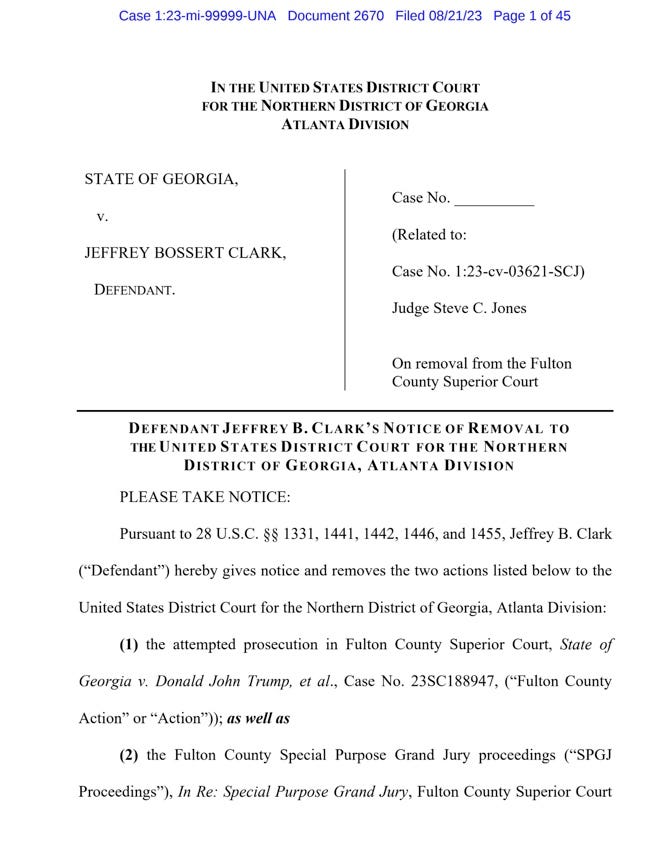
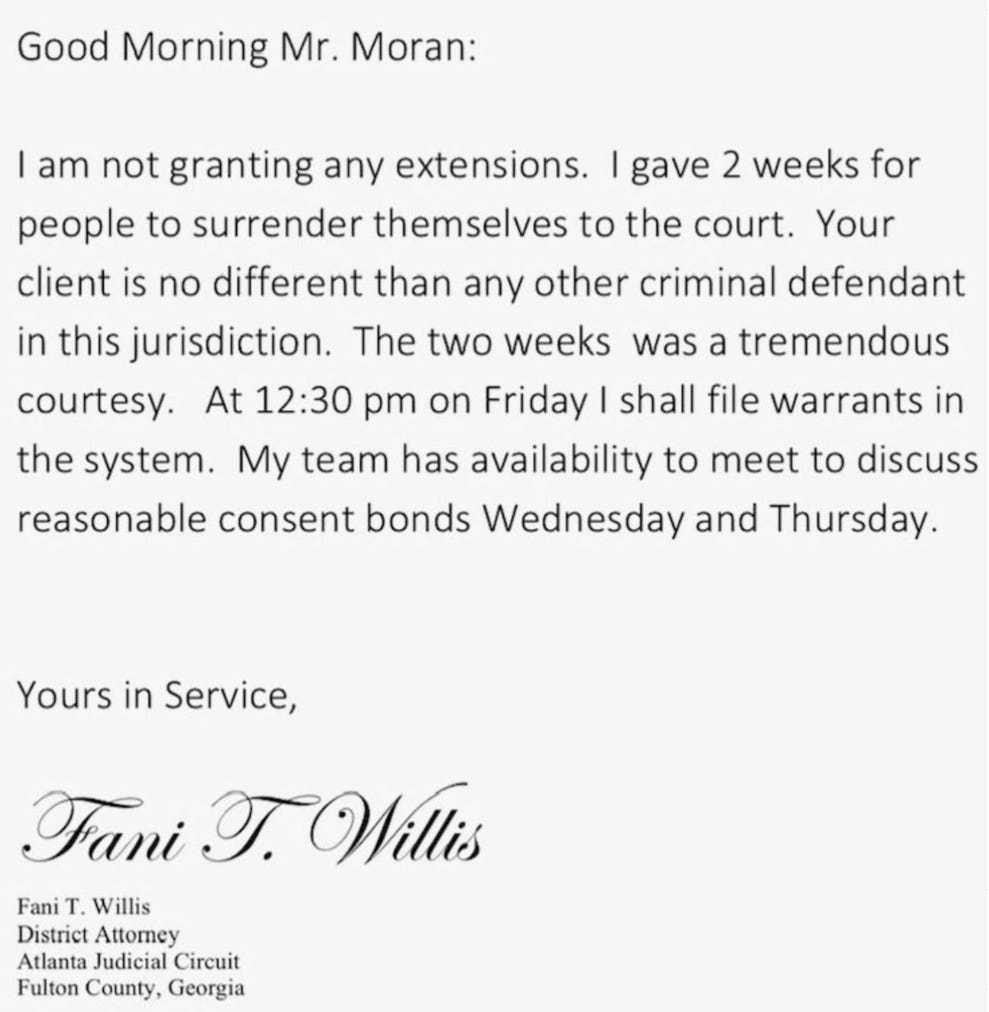
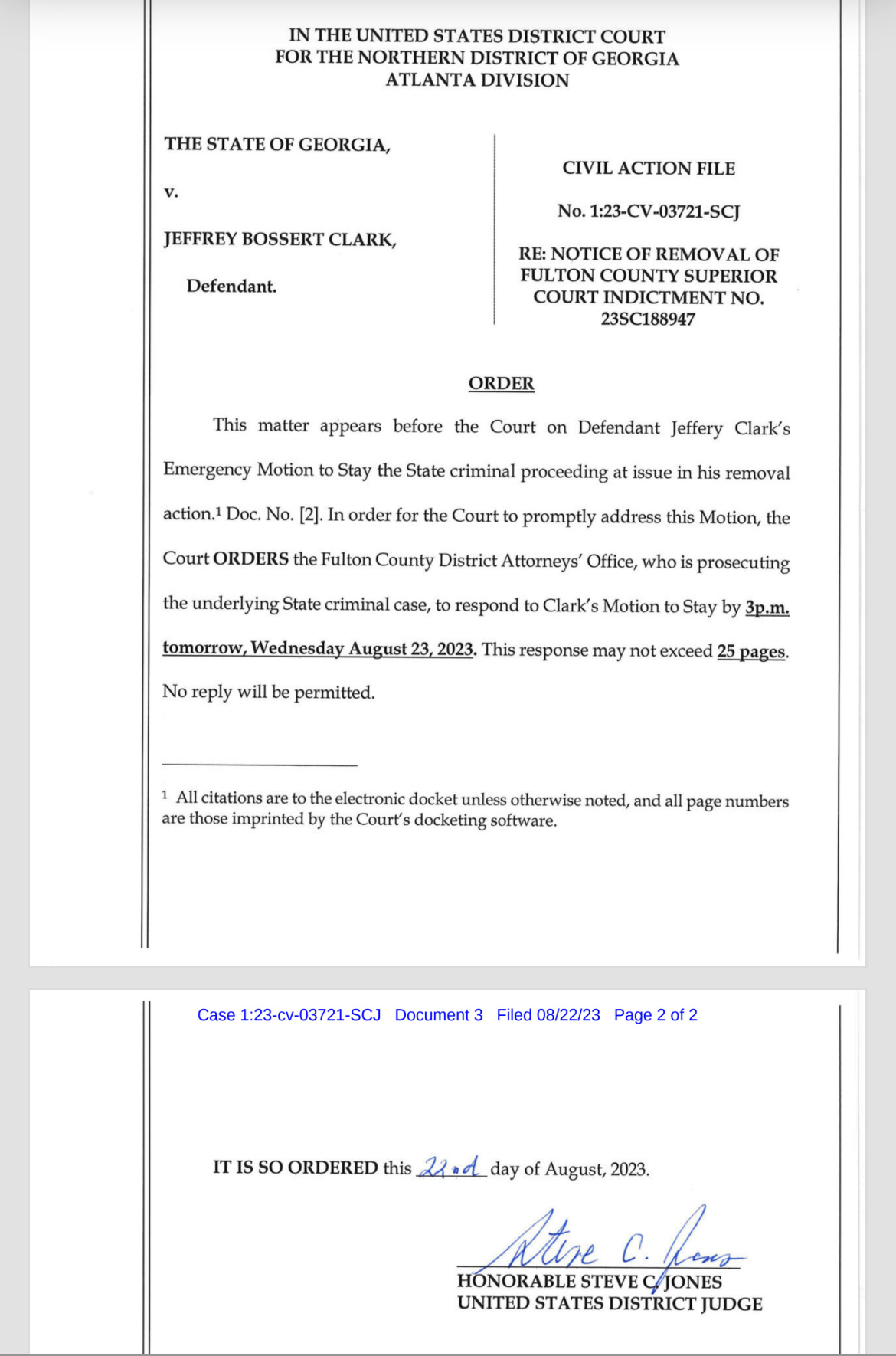
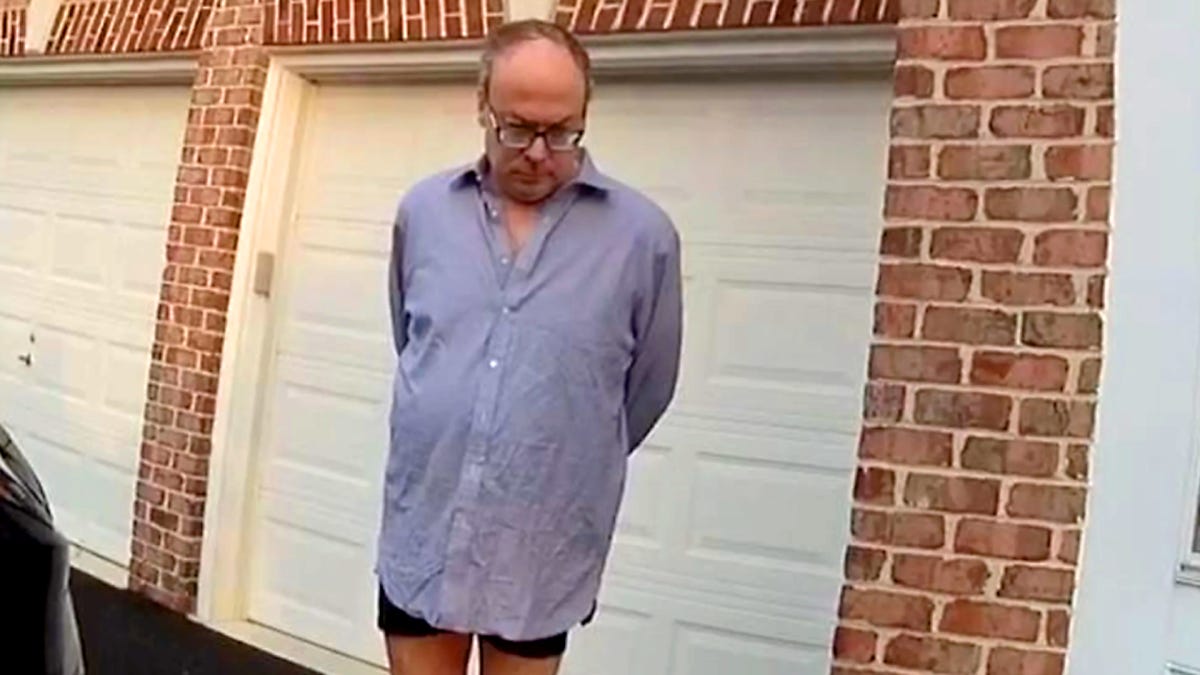
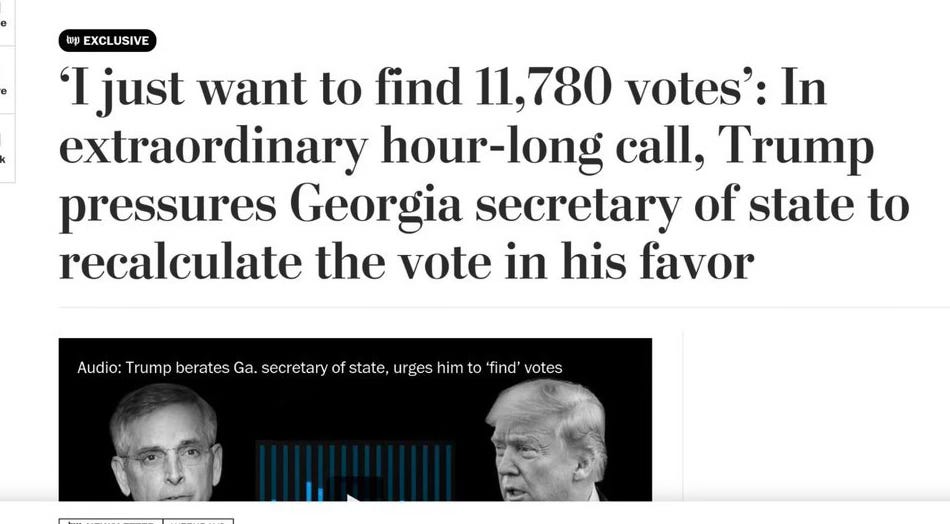
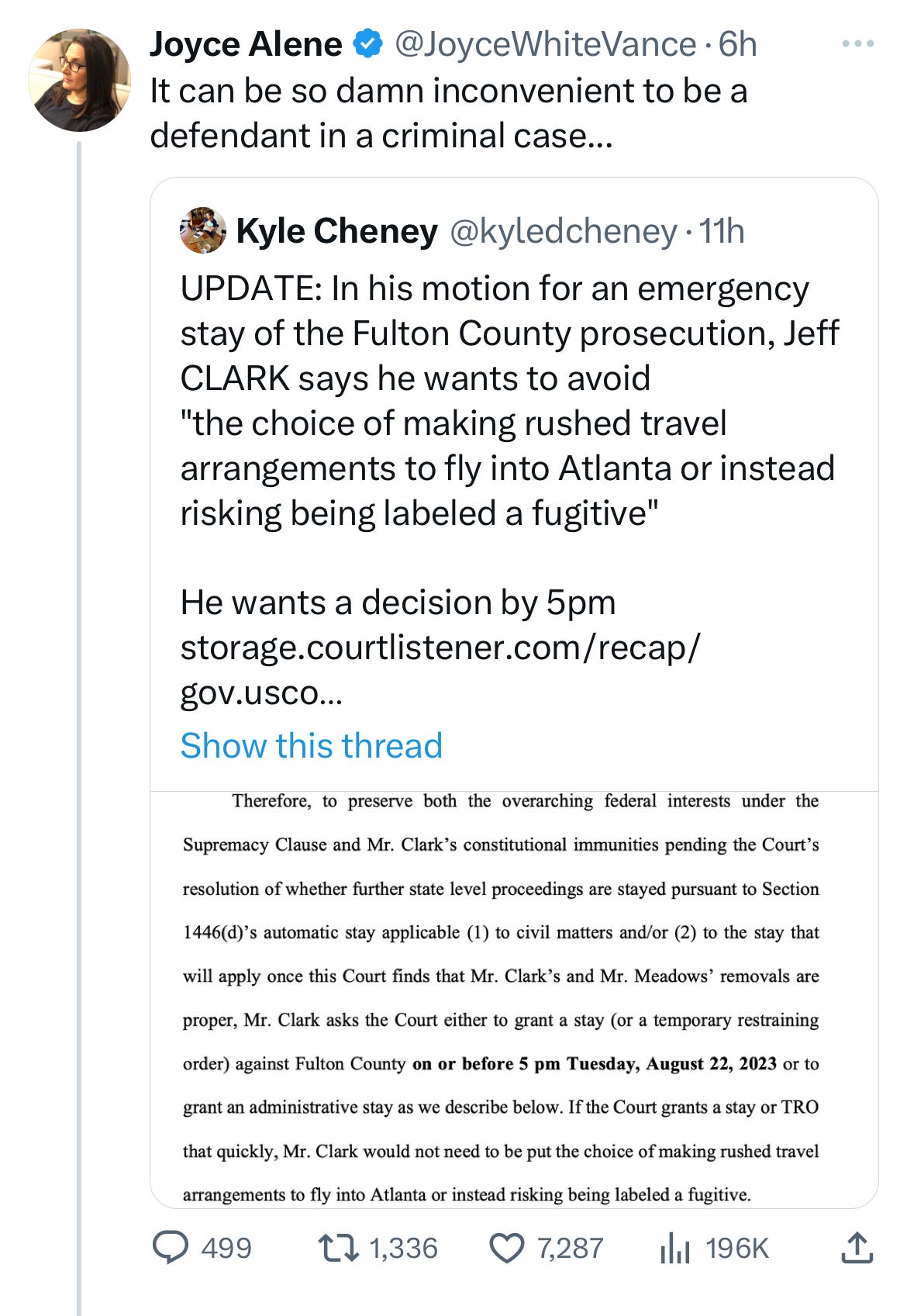
In all his legalese Mr. Clark still demonstrated the basic 5 vowels consistent with himself, his former boss, and his cronies: Arrogance, Entitlement, Ignorance, Obfuscation, and Unrepentance. Reap what you sow and pass it on to everyone else who soiled 1600 Pennsylvania Avenue.
Every instalment of civil discourse is a model of expository writing. But this one is in a class of its own.